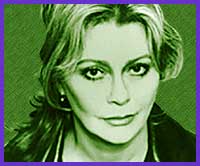Every drag queen is a diva. The reverse, however, is not true, even though the outward discrepancies are barely discernable.
With a larger-than-life image, overt femininity and emotional demands are attended under a spotlight, guarded by an undefiable glare and a well-heeled stomp – both creatures share these qualities, for which they are adored. But there, the similarity ends.
The drag queen is a male homage to a female image; he is an abbreviation of the unabridgable diva. The drag queen is motivated to display while the diva is motivated to express.
In Master Class, Terrence McNally’s tribute to the greatest diva, Maria Callas, the playwright puts her on display with a script any drag queen would kill for. The play garned McNally a Tony in 1997.
Now playing at the Royal Alexandra Theatre till Sat, May 1 and starring Elizabeth Ashley, Master Class uses a 1971 episode, when Callas taught opera master classes at Juilliard, as a premise for an uneven yet enjoyable night at the theatre.
At Juilliard, Callas’ assaults on student egos and sporadic attendance became infamous as the further exploits of a tempermental artist. McNally uses this set-up to show us an opera singer whose true gift lay more in her mesmerising presence than in her, at times, tortured soprano.
This is virtually a one-woman show as Callas speaks directly to the audience as if we are her student body. First, La Divina unnerves, by mocking her students. Then, she demands acknowledgment of her own greatness. Pleased by the response, Callas shares insight into attaining such success. Complimented, the audience relaxes, until the diva attacks again – and so starts the cycle which forms much of Master Class.
Later, other characters join the diva on stage and are witness to similar treatment. However, until the play breaks from this revolve, we have very little insight into Callas. We see what a terror she could be day to day, but we don’t know why she wants our attention – even if we are told how she gets it.
Given the high camp of this situation, it would take a keen observer indeed to tell us the difference between drag queen and diva.
And we are spared keen observances for the first part of the show, as Elizabeth Ashley, unwary of McNally’s script, eases onto the stage with little nuance – nuance, which may have differentiated between telling us what a diva acts like, and showing us who she is. Ashley shows no hunger for the role at this point. Although fascinating in her own style, Ashley does not approach the spirit of the whippet-like, high-strung Callas.
The real Maria Callas was more fading memory than tabloid exposition. She made no attempt to use her public celebrity to explain the private woman. Surrounded by paparrazzi, especially during her 16-year affair with Aristotle Onassis, she divulged little – speaking volumes with what she didn’t say.
And she didn’t say anything to paint a brighter picture, when in 1968, Onassis left her to marry Jacqueline Kennedy. She let the world think of her as the jilted heroine in a real life opera, when in fact, after a brief falling out, Callas and Onassis continued their relationship until his death in 1975.
When McNally incorporates the Onassis affair and other slices of life into Master Class, he allows his leading lady some stellar moments which offer more insight and less camp. At the end of both acts, we are allowed into the memory of Callas. The lights dim as we hear soaring recordings of Callas singing. Elizabeth Ashley, given some meat, shows her chops.
During these moments, she comes closest to the legend of Callas. We see a poor, fat, near-sighted Greek girl from New York, muscling herself into the gorgeous world of a reknowned diva, lying in bed with the richest man on earth. Vulnerability and emotional tremour are wrapped in steely determination. Look out gang, Miss Ashley’s taking out her Tony and giving it a rub.
During these monologues, the cream-coloured stage, through wonderful projections, transforms. As there are few filmed performances of Callas, our imaginations crave this boost over the top and into her career.
We need to feel why she did it, and in these moments, the answer becomes visceral and we ask ourselves: Why haven’t we? These are drag-queen dreams for the everyman. Centre stage at La Scala, roaring approval, divine costumes, all provide vindication for every banished pound, every sweaty rehearsal and every claw mark ever scratched.
Ultimately, these finishing moments are vindication for the tedious isn’t-she-a-pill-cycle which gets Master Class rolling. But given their brilliance, it is unfortunate that Ashley’s Divina didn’t come out of her dressing room until after the curtain was up.
Master Class.
$26.50-$76.50. 8pm. Mon-Sat.
2pm. Wed & Sat.
Till Sat, May 1.
Royal Alexandra Theatre.
260 King St W.
(416) 872-1212.

 Why you can trust Xtra
Why you can trust Xtra


